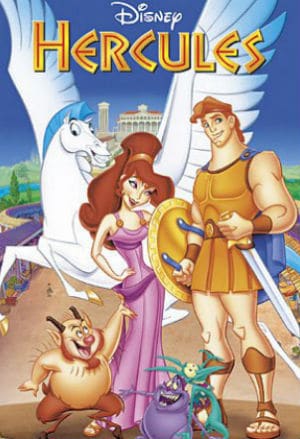
Welcome to Revisiting Disney! Today, we are looking at another film that was surprisingly hilarious, Hercules!!! Like always, I have labeled each category so if you want to skip to the parts that interest you most, feel free. And, of course, if you have any thoughts, burning or otherwise, please share in the comments!
BACKGROUND OF HERCULES
It seems like, in this time period anyway, Disney has been basing their animated films off of some surprising source material. A gruesome fairytale that makes people cry? Check. Hamlet and Exodus? Check. Historically inaccurate history? Check. Something by Victor “I Hate Happiness In Writing” Hugo? Check. Greek Mythology, a series of tales about a very dysfunctional immortal family that is always killing their children/their children’s friends? Well, we haven’t done that one yet!
Released on June 27th, 1997, work on Hercules began in 1992. The idea behind adapting Hercules was that it’s a story that has been told in many different ways for different reasons over the years, so there was a lot of wiggle-room when it came to the adaptation itself.
Hercules is brought to us by Director/Producer/Writer team of Ron Clements and John Musker, who had worked on Aladdin, The Little Mermaid, Treasure Planet, The Princess and the Frog, and Moana (coming to theaters November 23rd, 2016).
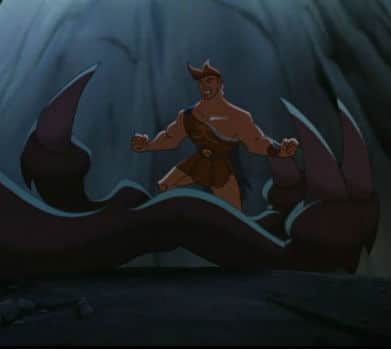
Photo: Disney
The angle this version takes is the classic coming-of-age story, adding the idea that Hercules is one of the first superheroes but also incredibly naive. He is contrasted with a heroine who is very cynical and wise in the ways of the world (this was a good decade for strong and different heroines from Disney, wasn’t it?), and a villain who you hate but who you still enjoy seeing on screen because he was just delightful. All the supporting characters, actually, are pretty amazing.
Hercules does teach valuable lessons, but I was sure that I was going to hate Hercules when I first heard about it because I was a big fan of Greek mythology when it came out. However, I started laughing while watching it, and it still cracks me up every time. When it was released, Hercules served to partially balance out the last two Disney animated films, Pocahontas and The Hunchback of Notre Dame, both of which are very dark and deal with some heavy material.
MUSIC
Hercules was nominated for one Academy Award and one Golden Globe each in 1998, in the category Best Music, Original Song for the song “Go the Distance.” As is becoming a trend in the 1990’s, the music was composed by Alan Menken, this time with lyrics by David Zippel. Zippel had worked on the music for The Swan Princess, and would go on to work on the music for Mulan and Captain America: The First Avenger (he wrote “The Star-Spangled Man With a Plan”). Menken and Zippel had worked together in the 1970’s when they had both been new to the music business.
In Bob Thomas’ book, he reports that Zippel really enjoyed word play, was a Tony-Award winner for his work and knew how to write songs that furthered the plot (and it shows). Another behind-the-scenes fact comes from the “Making Of” feature on the DVD. Alan Menken likes to give each score he writes what he calls its own personality. For Hercules, he used Gospel and R&B, mixed with a little bit of classical music to give the score a distinct (and I think very fun) feel.
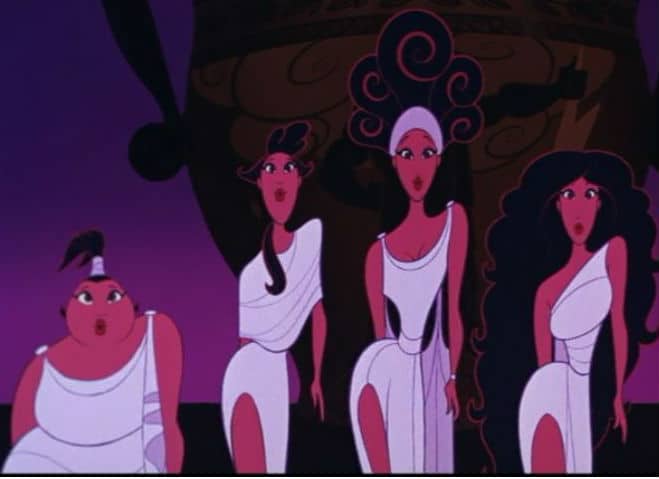
Photo: Disney
The use of the Muses, who sang in the Gospel style, was set up because, according to the directors, both emphasize hope and have a larger than life quality. The voice of Calliope, one of the Muses, points out that the Muses also act as narrators and guide the film along its way (in a fun and upbeat way).
The two different songs, “Go the Distance” and “Won’t Say I’m in Love,” have more of a pop vibe (according to Thomas), but fit in with the characters that are singing them. As a fun aside, Susan Egan, the voice of Megara, was the first to play Belle in the Broadway version of Beauty and the Beast.
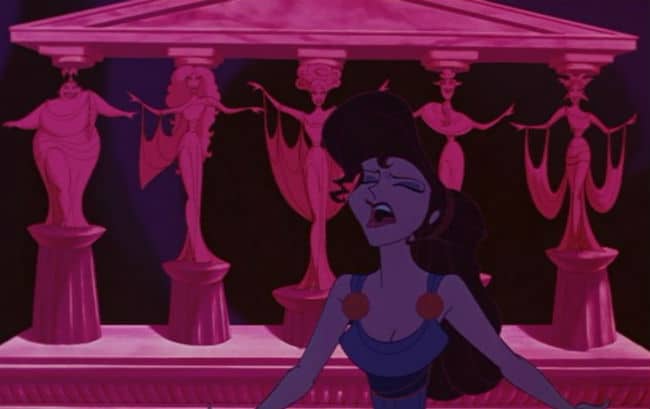
Photo: Disney
The idea behind the score was to make it unique, and also to fit it into the unique film that Hercules is. It’s not the typical Hercules movie, so it makes sense that the music should be unique too.
ANIMATION
The production team for Hercules went to Greece for a tour, so that when they drew Greece, they had an idea of what it looked like. This also helped them get inspiration for the film as a whole and fostered a sense of community among the team.
The design for the film was very heavily inspired by the work of Gerald Scarfe, an Englishman who worked on political cartoons and had a style that has been called “bold vision and complete irreverence,” things that fit beautifully with a film that is a comedy based on Greek mythology (Thomas 1992: 172).
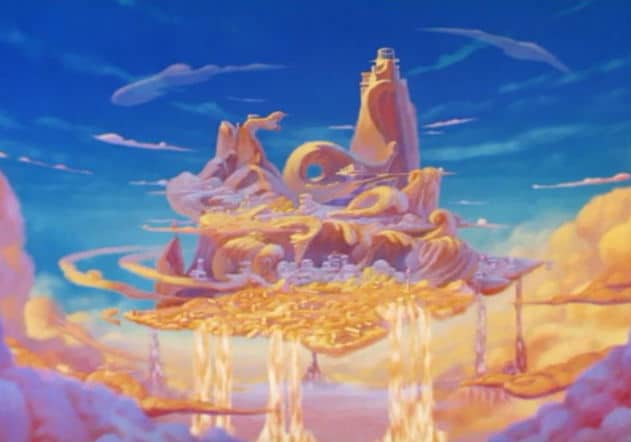
Photo: Disney
Scarfe was very excited to be involved because he had always been fascinated with Disney and the story and setting offered a lot to the imagination. Andy Gaskill served as the Art Director, with Sue Nichols working on the visual development, story, and graphic design. Her main job was to make sure that the work of Scarfe and other early artists (including Bruce Zick), were used and transferred into the style of Disney.
Nichols also made sure that the teams were all on the same page, production-wise, by creating reference guides that covered costuming, Greek style, and the production design (Thomas 1992: 177). This pre-done research made the whole process run smoother as well, meaning that the artists didn’t have to go and dig through a library for research. They could use the reference guides.
The lighting in Hercules is also well done. It’s not something that immediately jumps out at you, but once you see it, it makes an impact. This was part of the layout work done by Rasoul Azadani while the backgrounds were developed by Tom Cardone.
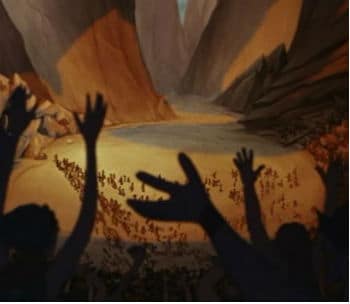
Photo: Disney
The backgrounds are hand painted, but then enhanced using the CAPS (computer animation production system) system to add depth to the art. This gives it a 3D look, and is a variation, in some ways, of the early multi-plane camera technique of the early years of Disney. Like the films before it, Hercules also takes advantage of the new technologies.
The use of CGI is best seen in Mount Olympus and the Hydra. The idea behind the use of CGI in these Disney films was to do things that the animators couldn’t do with 2D animation, like transform a cloud into a chair and show the change in the detail they wanted to. They were able to create a morph program, and then input the paintings into that to create the look they were going for.
The fact that the fight with the hydra is so epic was a major draw toward using that technology to choreograph the scene. It’s epic, and like the stampede in The Lion King, they were able to film it from multiple angles. Apparently, this is very difficult to do on paper (which I totally believe).
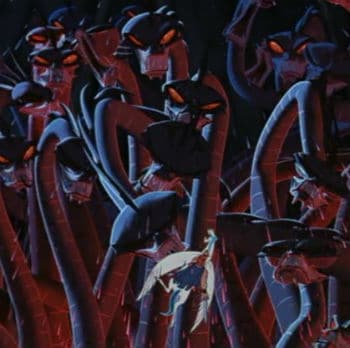
Photo: Disney
Final fun fact, animator Andreas Deja, best known for animating villains (Scar, Gaston, and Jafar), animated Hercules.
PLOT
The plot of Hercules opens with, as all epic things tend to do, the voice of Charlton Heston. He is preparing to tell us the story of Hercules, the amazing hero, and what makes a hero. He is interrupted by the Muses, who sing our introduction, beginning with the imprisonment of the Titans by Zeus (not how it happens in mythology, but it makes a catchier song than the actual story).
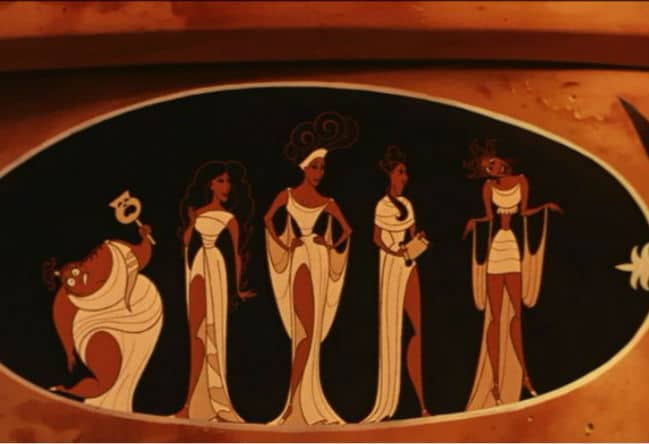
Photo: Disney
We then move to Olympus, where Zeus and Hera are throwing a party for their new son, Hercules. It’s clear from the get-go that Hercules is going to be very strong, and his parents are very proud of him.
Hades, Zeus’ brother who runs the Underworld appears at the celebration. There is clearly some resentment between the brothers, and the Muses tell us that Hades has a plan to “shake things up.” Hades also has two minions, Pain and Panic, who are wonderfully inept, and is also in contact with the Fates.
The Fates are in the Underworld, cutting the thread of a mortal’s life. Although technically, they aren’t supposed to do this, Hades is able to flatter them and convinces them to tell him if Hercules is going to mess up his “hostile takeover.” Turns out, yes, Hercules is the only thing standing between Hades and world domination. Also, Hades might be the funniest Disney villain ever. He’s hilarious.
Because Hercules is immortal, Hades can’t just have him killed. So, finding some juice that will turn Hercules mortal, he sends Pain and Panic to change Hercules mortal and then kill him. However, they’re startled by a mortal couple and Hercules didn’t drink the last drop.

Photo: Disney
This means that he’s still super strong, and when Pain and Panic try to kill him as giant snakes, he ties them together and throws them very far away. The gods, who had tried to find Hercules, were very sad because, as a mortal, Hercules had to stay on Earth. Luckily, the nice couple adopts Hercules and raise him as their own, so he’s not totally helpless.
Hercules grows into a very strong and very awkward teenager. He’s kind of a klutz and is always breaking things. Despite trying to help and do the right thing, Hercules is always causing trouble. After destroying the Agora and being called a dangerous freak, Hercules tells his (adopted) father that the people are right, he is a freak.
Hercules admits that he’s always felt that he doesn’t really belong, that he’s supposed to be somewhere else. His parents counter that when they admit that they found him, and give him the medal he was wearing when they found him. Hercules heads to the temple of Zeus to seek answers.
Zeus’ spirit appears in his statue and tells Hercules that he is actually his son, but was kidnapped and turned mortal. However, if Hercules can prove that he is a true hero, his godhood will be restored. Telling his son to find Phil, a trainer of heroes, Zeus also reunites his son with Pegasus, his childhood friend. The two head off to find Phil.
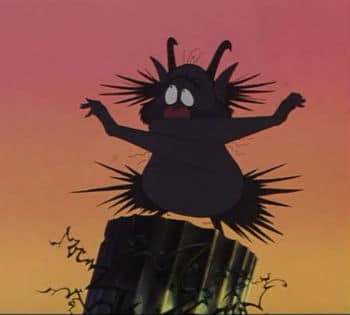
Photo: Disney
Although Phil is reluctant to train another hero because it always ends in disappointment (the last hero he trained was Achilles), Zeus hits him with a well-timed sign.
Following this reluctant agreement to train our young hero, Phil begins to get excited about the training, and we are treated to a wonderful training montage. This montage covers Hercules growing from an awkward teenager to a strong and strapping young man.
Having passed his basic training, Hercules is ready for what Phil calls a “road test.” They head to Thebes, “the Big Olive itself,” with Phil saying that if Hercules can make it there, he can make it anywhere.
On the way to Thebes, Hercules hears a scream and rushes to the rescue, thinking it’s a damsel in distress. There is a lovely lady who has been captured by a centaur, but she turns down Hercules’ offer of rescue by saying “I’m a damsel, I’m in distress, I can handle this.”
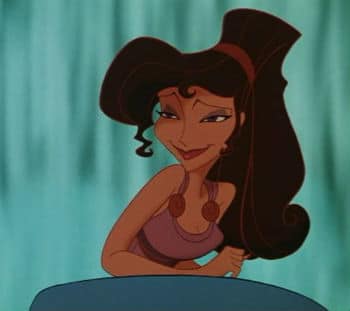
Photo: Disney
Smitten, our hero tries to help anyway and, although he is very bad at it, at first, he does succeed in beating the centaur. Distracted by Meg and, again, quite smitten, he doesn’t realize that both Phil and Pegasus are pretty jealous and upset at being ignored. However, Meg does notice and heads off, while Hercules and his friends continue on the road to Thebes.
In the forest, Meg finds a couple of rodents, who turn out to be Pain and Panic. We learn that the centaur was the River Guardian and that Meg is a minion of Hades, under contract.
Meg’s job had been to convince the River Guardian to join Hades’ in a rebellion, but because the River Guardian had been defeated, he won’t be fighting for anyone. When Hades tells her he’s adding time to her sentence, she protests that it wasn’t her fault, it was this hero named Hercules.
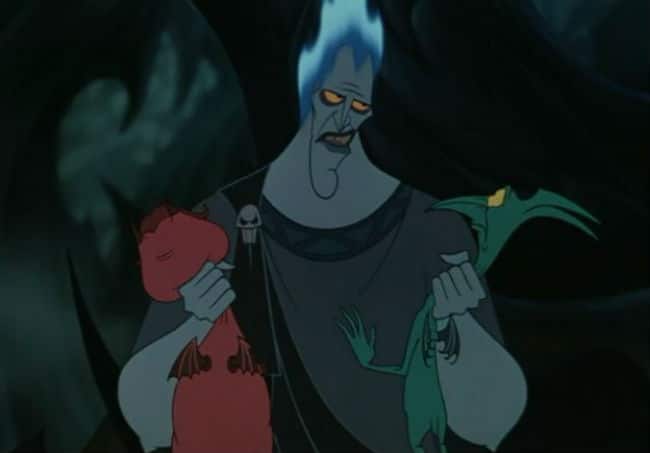
Photo: Disney
When Hades hears the name Hercules, he recognizes Hercules as his nephew and is pretty angry at Pain and Panic because they clearly didn’t kill him. Panic points out that at least Hercules is now mortal, so Hades begins to develop a new plan using his three minions.
In Thebes, we learn that things are very bad here and the people are kind of insane. However, because Hercules is an amateur hero, the people are not inclined to believe that he can do anything.
When Meg shows up to see if he can help save two little boys who were trapped in a rockslide, Hercules seizes his opportunity to do something heroic. The people are kind of impressed, but it turns out that the kids were actually Pain and Panic and the whole thing was set up by Hades.
The rock that Hercules moved was, actually, keeping the Hydra in prison. Hercules begins to fight the terrifying monster, only to find himself swallowed whole. Being resourceful, Hercules cuts his way out of the Hydra, beheading it from the inside.
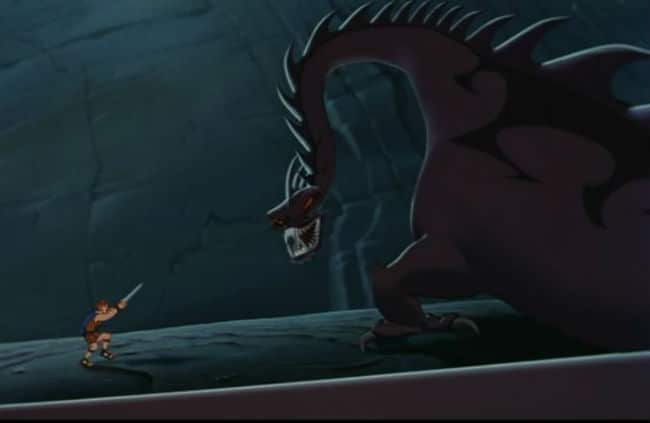
Photo: Disney
Hades knows a secret, mainly that if you cut off a head of a Hydra, three more grow. Hercules doesn’t seem to grasp this concept, however. Calling for Pegasus, the two fly around the monster, cutting off heads left and right until Phil finally yells at him to “forget the head slicing thing.”
Trying new methods to take out the heads, Hercules is successful until he falls off of Pegasus and is caught in the Hydra’s claw. The Hydra heads prepare to strike, but Hercules hits the side of the cliff, crushing the Hydra under the rubble. One claw fell to the side, and everyone but Hades is very sad about Hercules’ death.
However, the claw starts to shake and Hercules emerges. He has managed to survive and has also gained a reputation for being a hero. Two songs follow, highlighting Hercules’ battles and newfound celebrity.
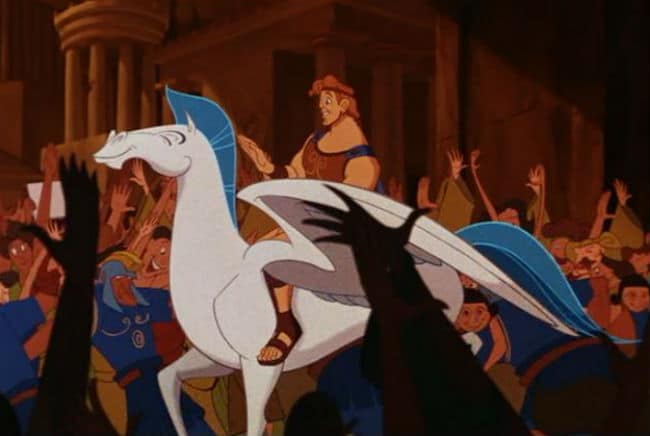
Photo: Disney
When he talks to Zeus later, however, Hercules is surprised to learn that being famous isn’t what makes him a hero. He protests that he’s never lost a fight and that he doesn’t know what else he can do, but Zeus tells him that he needs to learn for himself and that he just isn’t quite there yet.
Hades, meanwhile, is furious. Determining that he needs a new tactic to bring down Hercules, he decides to enlist Meg. When she protests that she’s “sworn off manhandling,” he tells us her story. It turns out that Meg sold her soul to Hades to save her boyfriend, but he left her. Hades also offers her a great deal; help him bring down Hercules, and she can have her freedom.
Meanwhile, Hercules struggles with his fame and asks Phil if he’s on the right track to becoming a god. Phil reminds him that he can go the distance and do anything he puts his mind to. However, this “can do anything attitude” seems to not include escaping from crazed fangirls. Luckily, he and Phil do have a plan in place and our hero does escape.
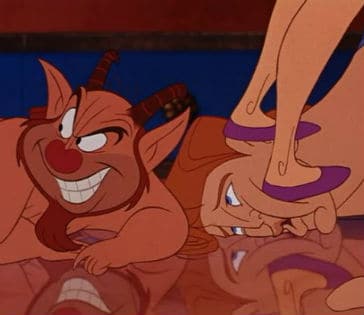
Photo: Disney
In the chaos, Meg has snuck into the room where Hercules is hiding and offers him a chance to relax by playing hooky. He resists halfheartedly but agrees to go. They have a wonderful day before Pain and Panic show up and remind Meg that she has a job to do.
Meg tries to find out what Hercules’ weakness’ are, using all her wiles. She’s surprised to find out that, other than occasionally breaking things by forgetting his strength, he’s basically perfect.
When they see a shooting star, Hercules admits that he wanted to be like everyone else as a kid. When Meg asks why he would want to be petty and dishonest, this leads to Hercules admitting that he thinks she is the “most amazing person with weak ankles he’s ever met,” and that when he’s with her, he feels less alone. Of course, having been burned before, she says that it’s better to be alone, then you can’t get hurt.
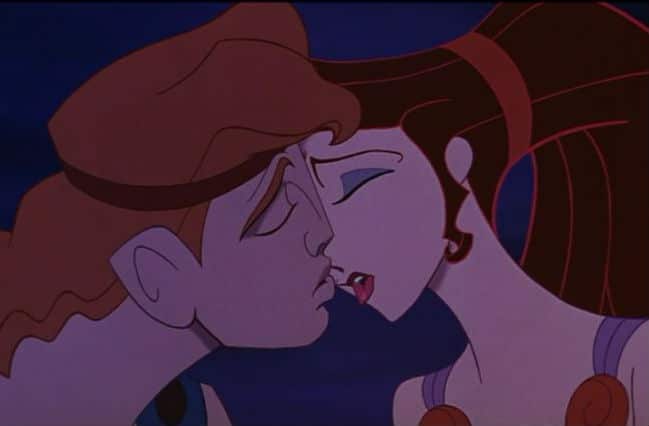
Photo: Disney
His response? He tells her that he’ll never hurt her, and she tells him that she doesn’t want to hurt him either. They’re about to kiss when Phil and Pegasus, who have been looking for Hercules all day, interrupt them. Hercules is to go back to the gym but kisses Meg on the cheek before he goes (throwing them both into an adorably confused state).
During the trip, Phil is knocked off of Pegasus and passes out, while Meg wrestles with the fact that she may have fallen in love with Hercules. Her musings are interrupted by Hades. When she refuses to work against Hercules, he reminds her that he owns her. Unfortunately, this is when Phil wakes up and overhears the worst part of the conversation. Feeling terrible, he feels like he has to tell Hercules the truth about Meg and sets off.
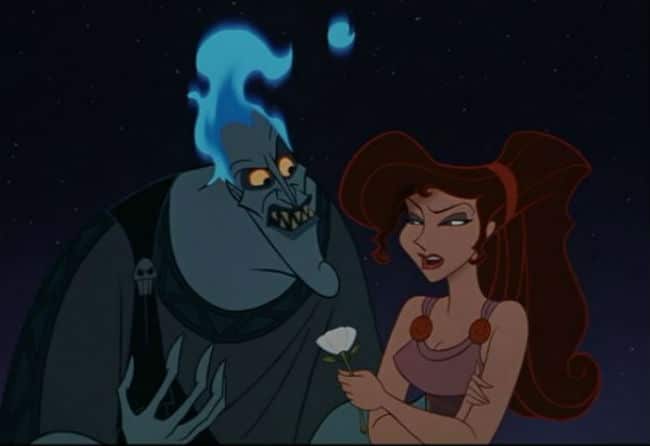
Photo: Disney
Sadly, Phil leaves before Meg can tell Hades, again, that she’s not going to work against Hercules because he’s honest and sweet and wouldn’t hurt her. When she says that he has no weaknesses, Hades realizes that Hercules does have a weakness, Meg. Also, the planets are aligned perfectly for Hades to free the Titans, as long as he can keep Hercules from fighting against him.
When Phil tries to tell Hercules what he’s learned about Meg, Hercules doesn’t take it well. Phil decides that he can’t watch Hercules be destroyed and leaves, heading home. When Phil is gone, Pain and Panic disguise themselves as a lady horse, trapping Pegasus as well. Hercules is now alone.
Hades appears with a tied-up Meg and offers to free her if Hercules will give up his strength for the next 24 hours. Hercules agrees, as long as Hades promises that Meg won’t be hurt at all. Hades agrees and takes Hercules’ strength. He then reveals that Meg was working for him all along (which is unfair, she didn’t have a choice in that matter). This crushes Hercules even more.
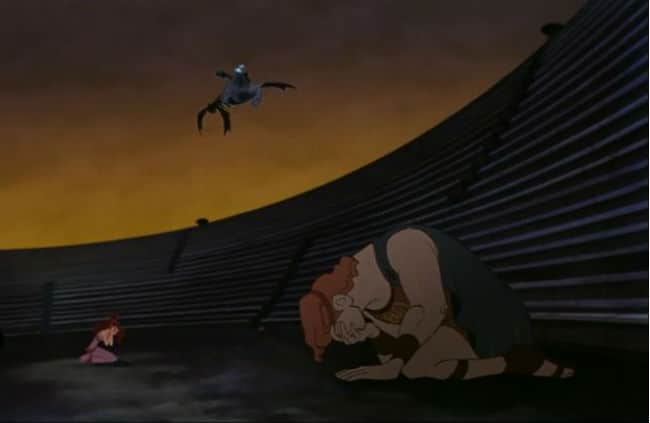
Photo: Disney
Hades heads off to free the Titans, leaving Meg and Hercules sobbing in the arena. Hades frees the Titans and send all but one to Olympus. The other is sent to Thebes to take care of Hercules. While the gods on Olympus put up a valiant fight, they are all captured. Meanwhile, Hercules is both without strength and his will to live, so he is losing spectacularly to the Cyclops.
Things are looking grim for the good guys when Meg frees Pegasus. Together, they go to find Phil and convince him to help Hercules. Phil tells Hercules that giving up is for rookies, and he’s willing to go the distance, is Herc?
Using his brain and bravery, Hercules is able to defeat the Cyclops. However, the Cyclops’ falling makes a pillar start to topple. Seeing it come down toward Hercules, (and realizing that he doesn’t see it), Meg rushes to him, pushes him out of the way, and is crushed instead. Because she is injured, the deal with Hades is broken, giving Hercules his strength back.
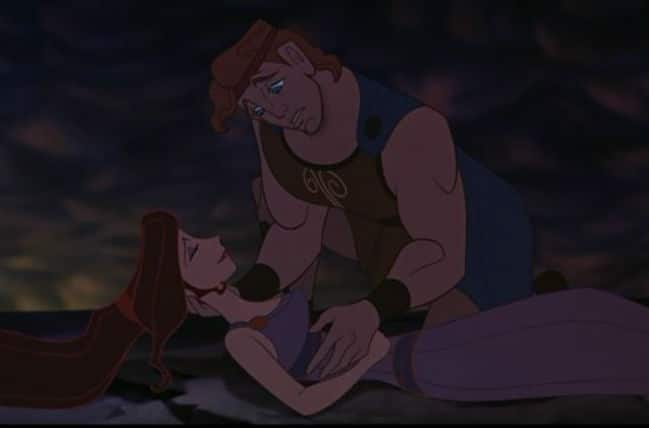
Photo: Disney
When he asks her why she tells him that people always do crazy things when they’re in love. She then tells Hercules that he can still stop Hades, and leaving Phil to watch over her, Hercules and Pegasus race to Mount Olympus. Once there, they free the gods and help Zeus vanquish the Titans, once and for all.
As Hades flees, he tells Hercules that Meg is dying, which she does, and Hercules is determined to bring her back. He goes to the Underworld and walks in on an angry Hades, who is fuming that Meg’s sudden conscience cost them the war.
Seeing Meg’s soul floating about, Hercules offers Hades a deal, his soul for Meg’s. Hades can’t think of any downsides to this, and agrees (though after Hercules dives in, he points out that Hercules will die before he can reach Meg’s soul).
As Hercules swims toward Meg, we see the Fates holding his thread of life and preparing to cut it. Just as they are about to snip it, killing our hero, the thread turns to gold. The thread won’t cut, and it turns out that Hercules is now a god!
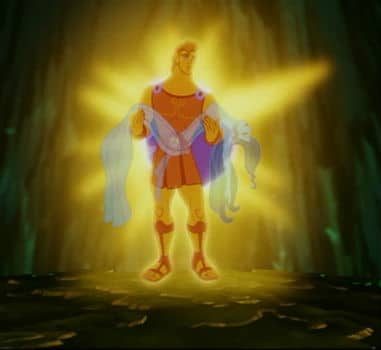
Photo: Disney
Hades is shocked, and his attempts at making things better result in him being punched into the whirlpool of souls. Hercules returns Meg to her body, telling her that people always do crazy things when they’re in love.
A cloud whisks them away to Mount Olympus, where Hercules finally meets his mother and father in real life (not in statue form). Because a true hero is someone who is selfless, his willingness to sacrifice his life for Meg’s made him a true hero.
Hercules is thrilled to be going home, but he sees Meg and realizes something. Without her, his life would be empty. He has realized where he belongs, on Earth with her. His parents are surprised, but grant his request and he is a mortal again. Hercules and Meg finally kiss. They then head back to Earth where they are greeted with fanfare and live, I assume, happily ever after (Phil’s dream came true too).
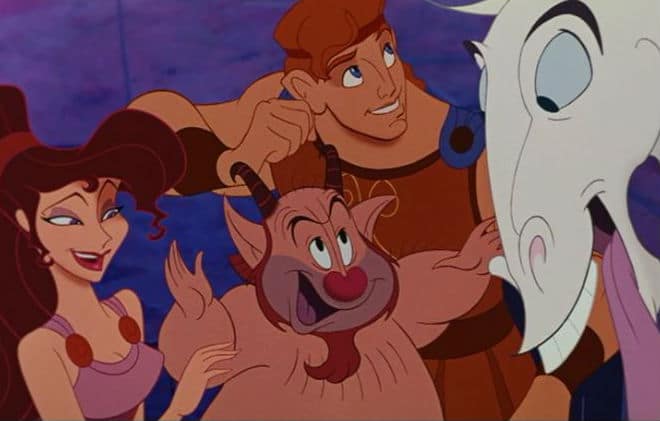
Photo: Disney
SOURCE MATERIAL
Alice Dewey, the producer of Hercules, remembers that on the visit the production team took to Greece, they had a tour guide who was also a scholar. Stories about Hercules kept coming up, and the scholar told them all the different versions of the myth. This reminded them that “myths are collections of stories. It’s an oral history, and those who told it embellished it for their own purposes,” (Thomas 1992: 169). She and the others on the team took this as permission to “tell the story in their own way,” which they did (Thomas 1992: 169).
Part of the appeal of Hercules was that there is a larger than life quality to it; one that is not just seen in the characters but also in the landscape of Greek mythology. Now, I’m going to be honest, there are lots of problems, mythologically speaking, with Hercules.
I’m not going to list all the problems, but some highlights: Hades wasn’t evil (per se), Hercules wasn’t Hera’s son, she hated him and tried to kill him numerous times. Hercules actually did harm Megara; Hera made him go insane and he killed her and their children as a result. He felt awful and consumed by guilt, which leads to his preforming the 12 Labors. However, the way Hercules and Meg met in this movie is very similar to how Hercules meets his second wife (who accidentally kills him. It’s a long and sad story).
The production team points out, however, that the whole “Hercules was an illegitimate child” and “his stepmother was always trying to kill him” thing might be a bit difficult to sell as a Disney movie. This led to making Zeus and Hera a happy couple and making Hades the villain, plus, the Underworld is a great place for a villain to be based.
I’m also not going to list the Easter Eggs in this film for fans of Greek Mythology, but they are there and they are delightful. Some of my favorites are lines from Phil about the heroes he’s trained, the references to the 12 Labors, and a nymph who turns into a tree to escape a suitor.
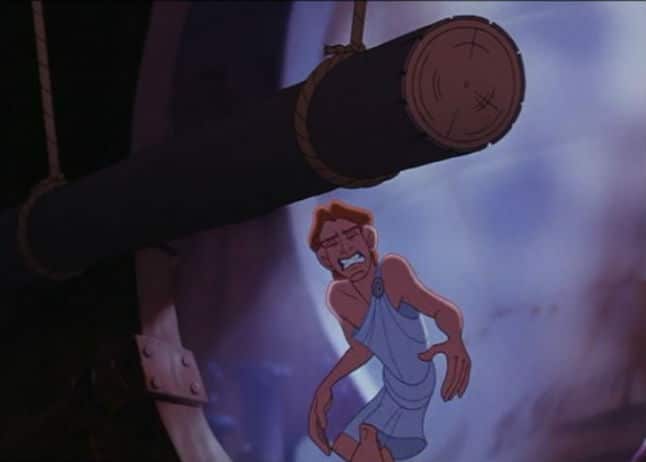
Photo: Disney
The story of Hercules has been around for a while now and retold in a variety of ways. Overall, according to the Internet Movie Database, there are over 115 films and series that were based on the legend of Hercules. There are also countless books about him, counterparts in other mythologies, and Hercules usually, at least, gets a mention when Greek Mythology comes up. In 2014 alone, there were two movies based on the legend, and one of them starred Dwayne “The Rock” Johnson as Hercules (which is fantastic casting).
There was also the wonderful series in the mid-1990s, Hercules: The Legendary Journeys. This series is still one of my favorite shows, and it starred Kevin Sorbo (plus, it had Bruce Campbell in a recurring role). This series later led to a spinoff show that you may know, Xena: Warrior Princess.
Why is Hercules so popular that every so often, we dust off his story and readapt it? If I had to guess, I would say that it’s because Hercules is, in a lot of his myths, a person who is stuck in impossible situations but, despite that, seems to try to do what’s right.
When he messes up, he wants to make it right. He saves countless people, and maybe I’m biased because I watched the Kevin Sorbo Hercules so much, but he uses his extraordinary power for good. I like what the animators said, he’s an early superhero. Not perfect, someone who suffered but still tries to make a difference and do good.
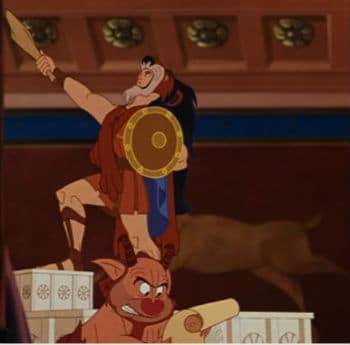
Photo: Disney
Although it doesn’t follow the mythology, like with The Sword and the Stone, Robin Hood, and Beauty and the Beast, Hercules just adds to an existing and much-beloved body of work. Hercules gets credit because there are tons of references to Greek Mythology, including other heroes and the 12 Labors of Hercules. These are fun Easter Eggs for fans of the myths, and, like the other films above, they are just another in a long line of retellings.
The 1990’s
1997 was a very interesting year in our world, with some very interesting things happening both in the US and abroad. Dolly the cloned sheep was born this year, and the film Titanic was released this year as well. Hong Kong was returned to China, after having been ruled by the UK for a while. The Israelis leave Hebron (on West Bank) while Princess Diana began to speak for a ban on land mines.
Princess Diana would also die this year, and her funeral would be televised and watched by millions, and Mother Teresa would die soon after. The Heavens Gate Cult would commit suicide in California, and there was a siege of the Japanese embassy in Peru (though all but one hostage would be freed).
On a happier note, Julie Taymor, the director of the Broadway version of The Lion King, would win a Tony for it while Microsoft became very valuable and Tony Blair became the UK’s Prime Minister. Scotland would also vote to form its own Parliament.
Again, I’m struck by how much negative stuff; how much death and destruction is occurring in the world this year. I didn’t tell you all of it but check it out. It was a rough year. However, I think that that’s why Hercules was popular, it was funny and bright, and provided some escapism from the things that were happening.
LESSONS LEARNED
Hercules doesn’t seem to try to hide the morals it’s sharing; they seem to be pretty plainly stated. But if you think of one I missed, please let me know in the comments! The first lesson that I learned from Hercules is that a true hero is measured by the strength of their heart, not their arm’s strength, or, as Phil says, “It takes more than sinew, comes down to what’s in you.”
Also, dreams aren’t for rookies, giving up is for rookies.
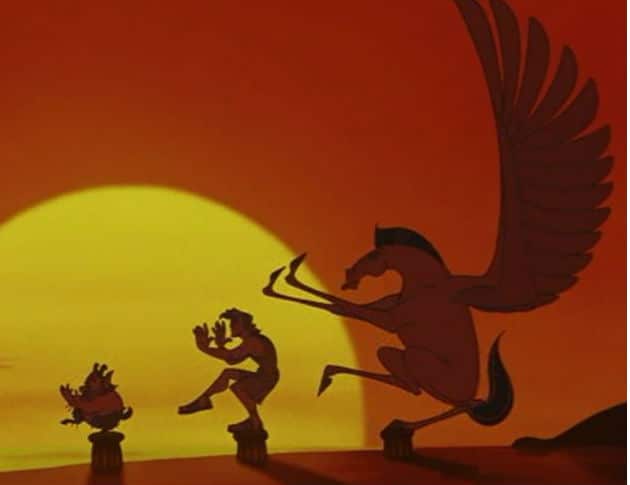
Photo: Disney
Another one, be careful who you trust. Meg thought she could trust her boyfriend, but after she sold her soul to save him, he left her and broke her heart. This left her (understandably) jaded, and willing to do anything to get her freedom back. She trusted Hades, and she trusted her boyfriend, and she got burned. True, it helped turn her into the sassiest and most cynical of the Disney leading ladies, but the lesson is still there.
Fourthly, people always do crazy things when they’re in love.

Photo: Disney
Fifthly, some dreams are worth fighting for.
Finally, everyone has a place they belong and a specific skill set that they can contribute to the world, whether its super strength or super sass, we all have something to share.
DOES IT HOLD UP?
Honestly, every time I watch this movie, I laugh hysterically. It’s a fun and upbeat comedy by Disney that clearly understands the source material, diving in and using it to great comedic effect. It’s one of those films that, if I’m having a rough day and need a laugh, will always get at least one chuckle out of me. It’s not Beauty and the Beast or The Lion King, but it’s not trying to be. Either way, it’s sure a lot of fun.
For next week: Mulan
If you enjoyed this post and the others in the Revisiting Disney series, and have found yourself wishing that you could find them all in one convenient and bound book with eight extra essays, there is an option for you! Check out A Journey Through Disney: My Look Back Through Disney Canon, now available on Amazon as both a Kindle book ($4.99) and a paperback ($11.99).
OTHER SOURCES:
https://thewaltdisneycompany.com/about-disney/disney-history
http://www.imdb.com
http://studioservices.go.com/disneystudios/history.html
http://www.thepeoplehistory.com/1997.html
http://www.kidzworld.com/article/4255-1990s-timeline
Bailey, Adrian. Walt Disney’s World of Fantasy. Everest House Publishers. New York, New York. 1982.
Finch, Christopher. The Art of Walt Disney: From Mickey Mouse to the Magic Kingdom. Harry N. Abrams, Inc. New York, New York. 1975.
Johnston, Ollie and Frank Thomas. The Disney Villain. Hyperion. New York, New York. 1993.
Sale, Roger. Fairy Tales and After: From Snow White to E.B. White. Harvard University Press. Cambridge, MA, 1978.
Tatar, Maria. The Annotated Classic Fairy Tales. W.W. Norton and Company. New York and London, 2002.
Thomas, Bob. Disney’s Art of Animation From Mickey Mouse to Hercules. Hyperion. New York, New York. 1992.
Wright, Gordon. The Ordeal of Total War: 1939-1945. Harper Torchbooks, Harper & Row. New York, Hagerstown, San Francisco, and London, 1968.
ARE YOU A ROMANCE FAN? FOLLOW THE SILVER PETTICOAT REVIEW:
 Our romance-themed entertainment site is on a mission to help you find the best period dramas, romance movies, TV shows, and books. Other topics include Jane Austen, Classic Hollywood, TV Couples, Fairy Tales, Romantic Living, Romanticism, and more. We’re damsels not in distress fighting for the all-new optimistic Romantic Revolution. Join us and subscribe. For more information, see our About, Old-Fashioned Romance 101, Modern Romanticism 101, and Romantic Living 101.
Our romance-themed entertainment site is on a mission to help you find the best period dramas, romance movies, TV shows, and books. Other topics include Jane Austen, Classic Hollywood, TV Couples, Fairy Tales, Romantic Living, Romanticism, and more. We’re damsels not in distress fighting for the all-new optimistic Romantic Revolution. Join us and subscribe. For more information, see our About, Old-Fashioned Romance 101, Modern Romanticism 101, and Romantic Living 101.
